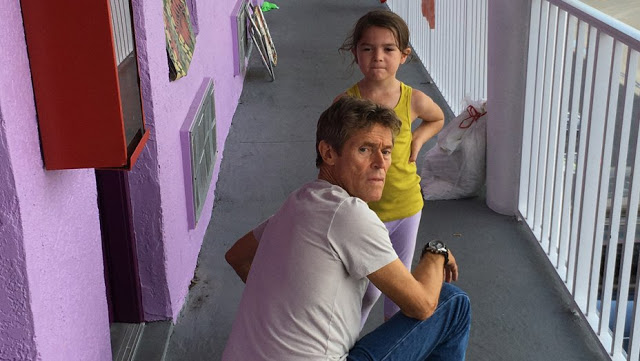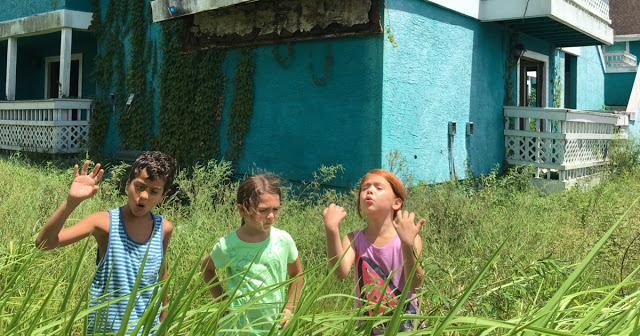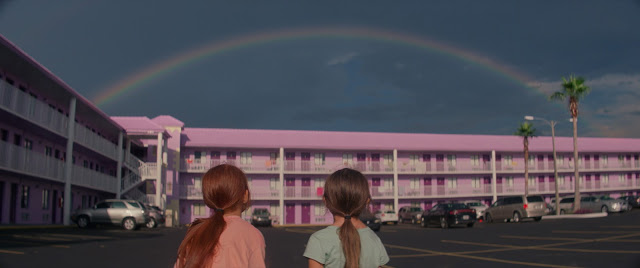It’s a funny thing, how a movie can sneak up on you. Take The Florida Project, Sean Baker’s striking and incrementally devastating new film, which transpires over the course of a languid summer in a low-rent motel complex just outside of Orlando. An attentive humanist with a keen eye for illuminative details, Baker is committed to conveying the sweaty tedium that afflicts his hard-luck characters. In fact, he so convincingly captures the housing development’s collective lethargy—the sweltering heat, the pervasive boredom, the maddening feeling of having nothing to do—that he is almost too successful. For the first half hour that I spent watching these restless children scampering around bland parking lots and darting through paint-peeling hallways, I found myself stifling a yawn. So imagine my surprise when, as the movie barreled into its mesmerizing climax, tears welled in my eyes and my heart pounded in my chest. The Florida Project starts with a snooze. It ends with a sledgehammer.
Not that its beginning is entirely disposable. Even when the movie flirts with narrative monotony, it always offers something visually arresting. Baker’s last film was Tangerine, a day-in-the-life story that was notable not just because it starred two transgender actresses, but because it was shot entirely on an iPhone. The Florida Project, by contrast, is triumphantly widescreen, with a brilliantly vivid palette and elegantly composed frames that recall the formal mastery of Raise the Red Lantern. The opening act essentially functions as a tour of the neighborhood, a candy-colored district dotted with dopily themed motels, indistinguishable strip malls, and rinky-dink food stands. The pastels keep popping, from the cheery orange glow of a grocery to the powder blue of a gift shop to the gentle lavender of the titular housing complex, a bleak and raucous purgatory called The Magic Castle.
That knockoff name—it may as well be called “The Magic Kingdom’s Armpit”—encapsulates the pitiful tackiness of the motel, which is located a few miles and a million lifetimes away from Walt Disney World. Managed by the gruff-but-compassionate Bobby (Willem Dafoe, wonderfully restrained), The Magic Castle seems to primarily house single moms and their rambunctious children, though it also attracts all manner of lowlifes: drug dealers, pedophiles, tourists who don’t know how to follow directions. Yet when we first meet Moonee (Brooklynn Kimberly Prince, stunning), the six-year-old girl who will be our guide and our heartbreaker, she’s untroubled by the residence’s low economic station and dubious clientele. After all, it’s summer, and she just wants to go outside and play.
“Play what?” a mother asks when Moonee inquires if her daughter, new arrival Jancey (Valeria Cotto), can join in some random frolicking. Yes, what? Baker’s evocation of the complex’s oppressive mundanity may be authentic, but for a time it feels aimless rather than compelling. That little of note happens is arguably the point, but it also means that the film initially seems as stuck as its characters, struggling to move forward, to assert itself.
Be patient. As The Florida Project proceeds, its rich environmental detail begins to acquire a more intimate power, especially as Baker gradually tightens his focus on Moonee and her mother, the twentysomething Halley (Bria Vinaite). With sea-green hair and winged tattoos that spread above her sternum, Halley is a looker, and she has a mouth to match. She’s irritable, spiteful, and prone to bursts of ferocious temper. She is also a fiercely protective mother, and Baker’s refusal to soften her edges makes her frequent displays of nurturing all the more affecting.
Halley is the most volatile figure in The Florida Project—over the course of the film, she punches, stomps, steals, and screams—but she is not its most important one. That would instead be Moonee, who is played by Prince with an alarming degree of emotional sophistication that only underlines her cherubic sweetness. And one of Baker’s savviest moves as a storyteller is his decision to depict the narrative largely from a child’s point of view. Beyond intensifying our empathy for Moonee, this understated approach yields enormous payoffs. A handful of initially inscrutable scenes—Moonee quietly playing with toys in the bathtub, or taking “swimsuit selfies” with her mom—eventually gain greater resonance, partly because we grow to understand their meaning, and partly because we know that Moonee doesn’t.
In one sense, Moonee is a cinematic cousin to Star, the teenage protagonist of American Honey, another movie that sculpted ostensibly unexceptional moments into a teeming portrait of disadvantaged youth. The difference is that, whereas Andrea Arnold’s film was a restless road picture, The Florida Project is stubbornly static, never straying more than a mile or two from its principal location. This stillness allows Baker to paint The Magic Castle almost as a supporting character itself. In addition to articulating the logistical banalities of impoverished life—once per month, Bobby forces Halley to move to the motel across the street for a night so that she never technically establishes residency, though he arranges for her to receive a discount rate—Baker makes his setting grow increasingly claustrophobic, those violet walls beginning to resemble the bars of a prison cell.
The third act of The Florida Project is wrenching in its inexorability, as Baker envelops Moonee and Halley with a net of intangible desperation, then tightens it with agonizing slowness. But he never loses his humanism, which informs the movie’s amazing climax, a burst of fantasia that is both heartrending and life-affirming. The film’s last few minutes join those of Captain Phillips, Phoenix, and La La Land on the short list of the great cinematic endings of this decade. For the vast majority of its running time, The Florida Project is resolutely pragmatic, but in its final moments, it blurs the line between reality and fantasy, and between movies and magic.
Jeremy Beck is the editor-in-chief of MovieManifesto. He watches more movies and television than he probably should.




